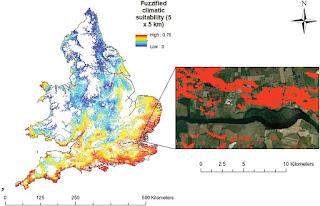[see PD18092024 below]
Program: https://momentum.csic.es
Project: High resolution agroclimatic variables for field trials and adaptation
of cereal crops (CLIMACER)
Location: Zaragoza, Aragón, Spain (Estación Experimental de Aula Dei-CSIC)
Principal Investigators:
- Bruno Contreras Moreira (Computational and Structural Biology , GitHub, bcontreras at eead.csic.es , +34 976716089)
- Santiago Beguería (Erosion and Soil and Water Evaluation , GitHub, sbegueria at eead.csic.es, +34 976716158)
PROJECT SUMMARY
Understanding how crops respond and adapt to climate change is critical to ensuring food security and agricultural sustainability. Despite the existence of climatic data repositories, it is still challenging to calculate agroclimatic variables appropriate to the phenology of each crop, such as days of vernalization of winter cereal crops. This hinders the development of effective adaptation strategies. CLIMACER project addresses these limitations with two objectives. The first consists on developing open source tools for customized calculation of high-resolution agroclimatic indices based on public data, which will be used in two case studies of genotype-environment association with barley and Sinapis alba populations sequenced in previous projects. The second is to compile a FAIR database that will aggregate cereal trial data from the GENVCE network along with agroclimatic indices for diverse trial locations.
 |
| Distribution of 4 barley subpopulations in mainland Spain, from https://doi.org/10.1111/mec.15009. |
Tech and scientific fields: Climate change and biodiversity,
platform of climate services, high-throughput data processing, data
integration and analysis, computational biology
PROFESSIONAL PROFILE
Minimum requirements:
- Fluency in Spanish and English.
- Science university degree (computer science, biology, biochemistry, maths, physics, …).
- Programming ans scripting languages.
Other skills to be considered:
- R and/or Python programming skills.
- Software development skills (API creation, source code repositories, etc).
- Document digitalization skills (OCR).
- Database management and/or data science skills.
- Bioinformatics and/or geo-information science skills.
WHAT WE OFFER
A training program will be customized for the hired person, with two alternative paths: a) enrolling on a Master’s program; or, b) attending courses on scripting, bioinformatics, computer programming and data science. We also plan for the hired person to c) attend conferences on climatology, geoscience and genomics, d) organize a workshop in collaboration with CIHEAM Zaragoza to teach how to use the resulting API and d) to take part in research secondments for training in diverse national and international labs from 2025 to 2027.
Contract conditions
Indefinite contract for a University Graduate associated with the Momentum Project of 4 years' duration according to Spanish science law. Gross annual salary (37.000 € - 41.000 €).
Start of contract: before 31 December 2024
Application instructions and help
- https://momentum.csic.es
- Register and upload your qualifications at https://sede.csic.gob.es/tramites/bolsa-de-trabajo by September 20th
27th - Titulado Superior FC1 / University Graduate FC1 (Out-of-Agreement Labour Exchange).
- Choose at least one of the following areas and topics/ámbitos:
- 8903 Recursos Naturales: Procesos de la geohidrosfera, Ejes transversales: Cambio Global, Biología de Organismos y Sistemas: Bioinformática
8905 Ciencia y Tecnologías Físicas: Sistemas Complejos, Informática, Tecnologías de la Información y Comunicaciones- Select our research center "Estación Experimental de Aula Dei (EEAD-CSIC)"
- Please pay attention to requirements of foreign degrees.
- The status of candidates at the bolsa is updated weekly or even less prequently in August.
- Questions to: momentum at csic.es or the PIs
We will update this post as more information becomes available.
PD18092024: hemos comprobado que en la aplicación de la bolsa es posible seleccionar dos áreas, así que podéis apuntaros a otras áreas, por ejemplo "8905 Ciencia y Tecnologías Físicas", y ámbitos como Sistemas Complejos, Informática o Tecnologías de la Información y Comunicaciones
PD25112024: proceso cerrado

